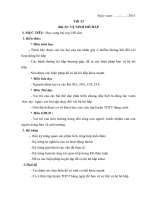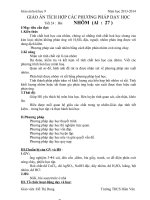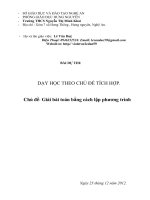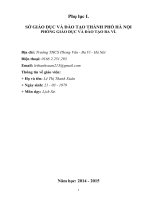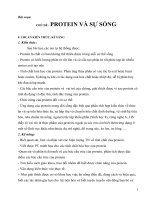giáo án tích hợp liên môn Integrated lesson plan grade 11 unit 8 listening
Bạn đang xem bản rút gọn của tài liệu. Xem và tải ngay bản đầy đủ của tài liệu tại đây (1.04 MB, 14 trang )
Warm up: Tell the names of
these things
kimono
Lucky money
sumo
firework
cherry flower
Today we will learn about how the
New Year is celebrated in Japan.
Before you listen
* Work in pairs. Guess which of the following activities the
Japanese often do on their New Year’s Days.
•
exchanging gifts and cards.
•
decorating the house with peach flowers.
•
wearing kimonos or special dress.
•
giving/ receiving lucky money.
•
going to the pagoda.
•
visiting friends.
Before you listen
What other things do you think the Japanese
also do at the New Year?
Before you listen
* Listen and repeat.
- kimono (n):
- shrine (n):
- pine trees (plural n):
- represent (v):
(n):
- housewives (plural n)
- longevity (n):
- constancy (n):
- similarities (n):
Áo kimono
Đền thờ, miếu
Cây thông
Tượng trưng cho, biểu tượng
Người nội trợ
= long life: tuổi thọ
Tính kiên trì, bền bỉ
Sự giống nhau
Sự tượng trưng, biểu tượng
* Task 1. Listen and tick ( ) the things you hear.
While you listen
1. They put on special clothes.
2. Everyone cleans the house.
3. Bells ring 108 times.
4. Housewives prepare special foods.
5. They decorate their houses with kumquat trees
6. They go to a shrine
7. They give each other “lucky money”.
8. They drink rice wine.
9. They play cards.
10. They watch television.
11. They eat a special meal.
* Task 1. Listen and tick () the things you hear.
While you listen
1. They put on special clothes.
2. Everyone cleans the house.
3. Bells ring 108 times.
4. Housewives prepare special foods.
5. They decorate their houses with kumquat trees
6. They go to a shrine
7. They give each other “lucky money”.
8. They drink rice wine.
9. They play cards.
10. They watch television.
11. They eat a special meal.
* Task 2. Listen again and answer the following questions.
While you listen
1. Why do Japanese do a big clean up before the New Year
comes?
2. Where do the Japanese hear the bells from?
4. Do the Japanese often celebrate the New Year with their
friends?
3. What do the Japanese often wear when they go to visit their
shrines?
-> No, New Year’s Day is mostly celebrated among family
only.
-> Because they want to get rid of the dirt of the old year
and welcome the New Year.
-> from television or radio.
-> kimonos or special dress.
After you listen: Work in groups: Compare the following
aspects of the Vietnamese New Year with those of the Japanese one.
Activities Japan Vietnam
Preparations
Foods and
clothes
Activities on
New Year’s
Eve
People to
celebrate with
Begin a few days before
the New Year
Cook special food; Dress
kimonos or special dress
Clean up and decorate
the houses with cherry
flowers; Watch the
national singing contest
on TV; Go to the shrine;
Drink rice wine
among family only
Begin many days
before the New Year
Cook traditional
foods; Dress ao dai,
suits, no kimonos
Clean up and
decorate the houses
with peach/apricot
flowers; Watch TV;
Go to the pagoda; …
with every family/
relatives
Work in groups: Use the knowledge in
Literature, in History and in reality to
discuss the following questions:
1. What celebrations do you know in Viet
Nam as well as in the world?
2. Can you describe one of your most favorite
festivals?
3. What do you think of Vietnamese culture in
organizing a celebration?
Discussion
Discussion
Use the knowledge in Civic Education
to discuss this question:
“ What should we do to preserve all good
values and culture of the festivals in
Vietnam?”
VI. Wrapping up
1. Consolidation
2. Homework:
-, Learn new words.
-, Write a short paragraph to compare the
similarities and the differences in
celebrating The New Year in Japan and
in Vietnam.
-, Prepare the new lesson : Writing


